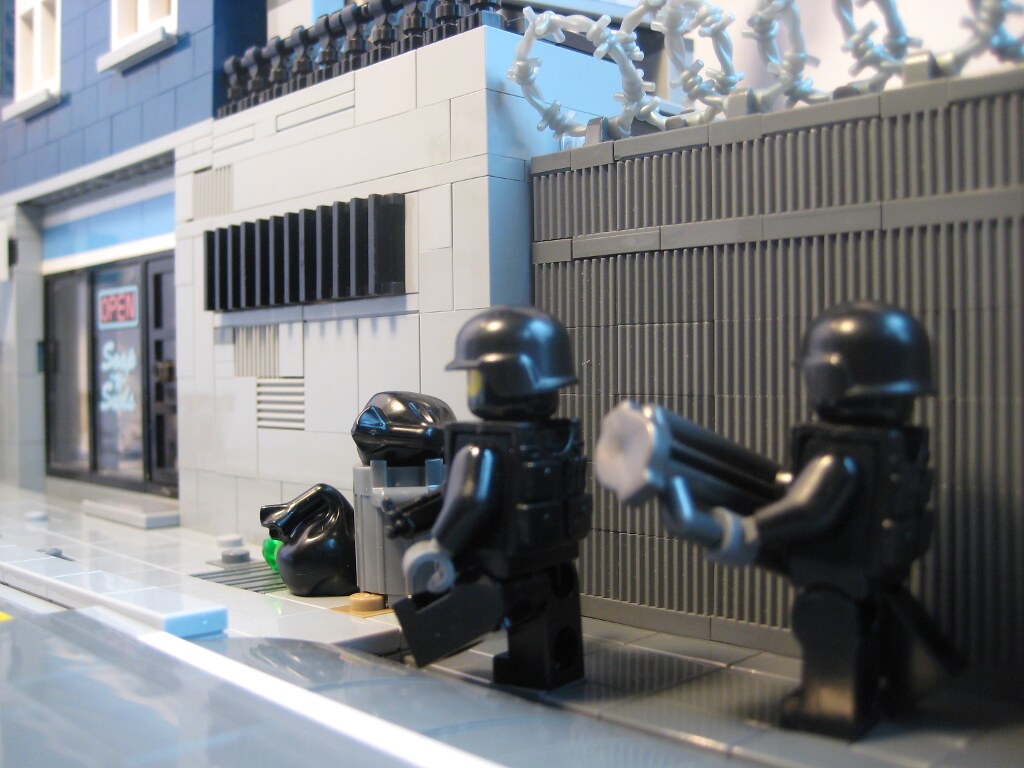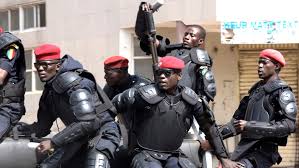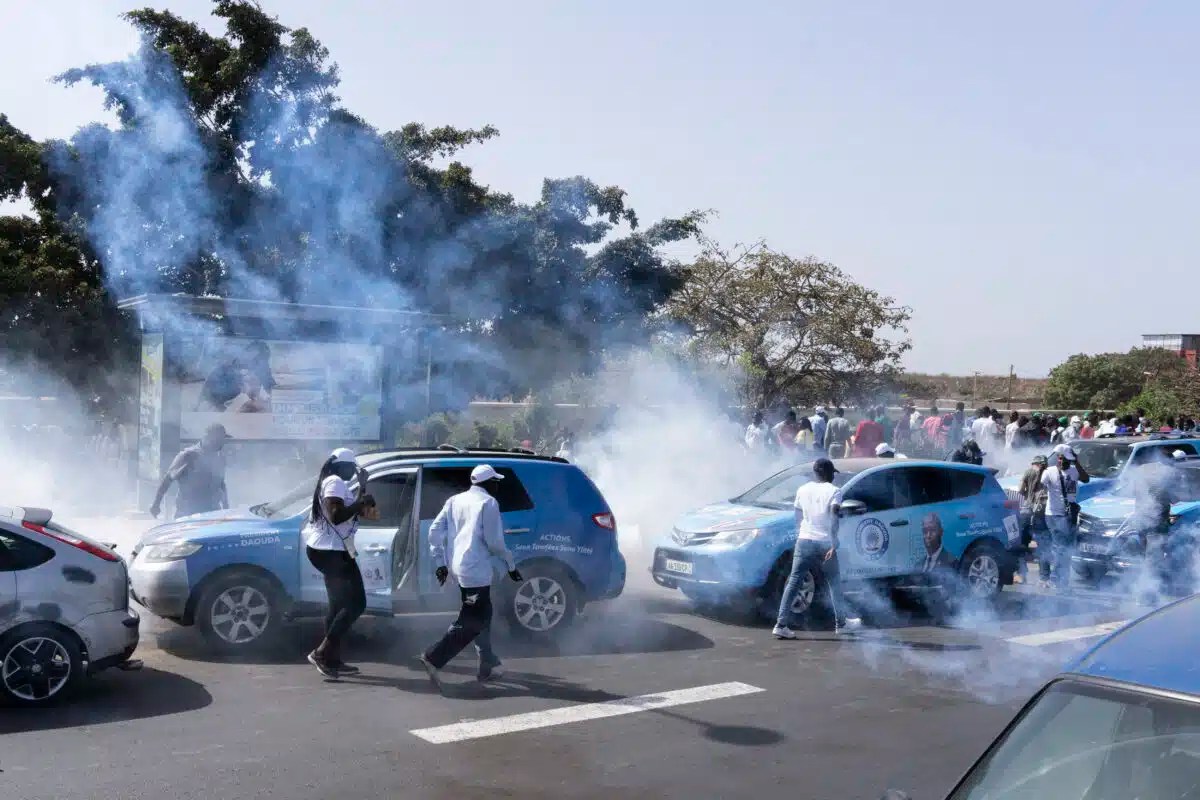- Joined
- Jan 17, 2010
- Messages
- 4,532
- Reaction score
- 5,496
Mobile internet access has also been restricted, as parliament begins debate on bill to extend Macky Sall’s presidency
Riot police fired teargas to break up crowds trying to gather outside Senegal’s national assembly on Monday to protest against the president’s abrupt postponement of elections over the weekend.
As protesters shouted slogans, parliament began debating a bill that would reschedule the 25 February vote for 25 August and extend Macky Sall’s mandate as president until his successor is installed.

Sall’s unprecedented announcement on Saturday pitched the west African country into uncharted constitutional waters that threaten to further tarnish its reputation as a bastion of democratic stability in a region swept by coups.
“They are trying to extend the president’s term, which is illegal and not allowed,” said Mohammad Mbengue, one of the protesters.
About 100 people gathered outside parliament on Monday after confrontations on Sunday, chanting “Macky Sall is a dictator”. Police chased them into side streets and made arrests.
Authorities temporarily restricted mobile internet access from Sunday night, citing hate messages on social media and threats to public order. Several schools sent pupils home early.
The private Walf television channel said it had been taken off air on Sunday and that its licence had been revoked.
“Senegal has been known as a country with a strong democracy, but this is no longer the case,” said Dame, another protester who only gave his first name. “The only thing we want is a fair election.” He said he was worried Sall would cling on to power indefinitely.
The African Union joined calls on Monday from regional bodies and western governments for a new election date to be set as soon as possible.

Sall said he had delayed the election because of a dispute over the candidate list and alleged corruption within the constitutional body that handled it.
The opposition Senegalese Democratic party (PDS), whose candidate was barred from running because of dual nationality issues, supports a delay and proposed the postponement bill in parliament before Sall’s announcement.
Others, however, reacted angrily. The F24 platform, a large group of civil society organisations behind past demonstrations, and the opposition presidential candidate Khalifa Sall, a former mayor of the capital, Dakar, called it an “institutional coup”.
Some candidates said they would push ahead with campaigns meant to begin over the weekend. Two – Khalifa Sall and Aly Ngouille – said they would challenge the postponement in court.
At least two candidates were detained when police in riot gear broke up protests in Dakar on Sunday, firing teargas and rounding up participants. Another was injured and taken to hospital, his team said.

The president’s announcement and the outcry it prompted have raised fears of a repeat of violent protests that have broken out over the past three years over concerns Macky Sall would run for a third term and the alleged political sidelining of the opposition leader Ousmane Sonko.
“The coming months will be uncertain, and we do not think the police will be able to contain all popular anger,” Oxford Economics said in a note.
The postponement bill needs to be backed by at least three-fifths of the national assembly in order to pass.
It could go through if the ruling party, which holds 49% of the seats, and the opposition coalition that includes the PDS both vote for it, according to a Barclays analysis. “Such a postponement could open the door for subsequent postponements and allow the president to do many things,” it said in a note.

https://www.theguardian.com/world/2...ile-internet-amid-protests-postponed-election
Riot police fired teargas to break up crowds trying to gather outside Senegal’s national assembly on Monday to protest against the president’s abrupt postponement of elections over the weekend.
As protesters shouted slogans, parliament began debating a bill that would reschedule the 25 February vote for 25 August and extend Macky Sall’s mandate as president until his successor is installed.

Sall’s unprecedented announcement on Saturday pitched the west African country into uncharted constitutional waters that threaten to further tarnish its reputation as a bastion of democratic stability in a region swept by coups.
“They are trying to extend the president’s term, which is illegal and not allowed,” said Mohammad Mbengue, one of the protesters.
About 100 people gathered outside parliament on Monday after confrontations on Sunday, chanting “Macky Sall is a dictator”. Police chased them into side streets and made arrests.
Authorities temporarily restricted mobile internet access from Sunday night, citing hate messages on social media and threats to public order. Several schools sent pupils home early.
The private Walf television channel said it had been taken off air on Sunday and that its licence had been revoked.
“Senegal has been known as a country with a strong democracy, but this is no longer the case,” said Dame, another protester who only gave his first name. “The only thing we want is a fair election.” He said he was worried Sall would cling on to power indefinitely.
The African Union joined calls on Monday from regional bodies and western governments for a new election date to be set as soon as possible.

Sall said he had delayed the election because of a dispute over the candidate list and alleged corruption within the constitutional body that handled it.
The opposition Senegalese Democratic party (PDS), whose candidate was barred from running because of dual nationality issues, supports a delay and proposed the postponement bill in parliament before Sall’s announcement.
Others, however, reacted angrily. The F24 platform, a large group of civil society organisations behind past demonstrations, and the opposition presidential candidate Khalifa Sall, a former mayor of the capital, Dakar, called it an “institutional coup”.
Some candidates said they would push ahead with campaigns meant to begin over the weekend. Two – Khalifa Sall and Aly Ngouille – said they would challenge the postponement in court.
At least two candidates were detained when police in riot gear broke up protests in Dakar on Sunday, firing teargas and rounding up participants. Another was injured and taken to hospital, his team said.
The president’s announcement and the outcry it prompted have raised fears of a repeat of violent protests that have broken out over the past three years over concerns Macky Sall would run for a third term and the alleged political sidelining of the opposition leader Ousmane Sonko.
“The coming months will be uncertain, and we do not think the police will be able to contain all popular anger,” Oxford Economics said in a note.
The postponement bill needs to be backed by at least three-fifths of the national assembly in order to pass.
It could go through if the ruling party, which holds 49% of the seats, and the opposition coalition that includes the PDS both vote for it, according to a Barclays analysis. “Such a postponement could open the door for subsequent postponements and allow the president to do many things,” it said in a note.

https://www.theguardian.com/world/2...ile-internet-amid-protests-postponed-election

